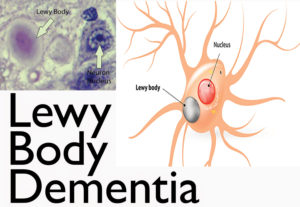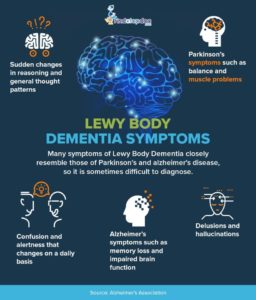How to Diagnose for LBD:
1-Most important is getting an experienced clinician within the medical community who should perform a diagnostic evaluation. If one is not available, the neurology department of the nearest medical university should be able to recommend appropriate resources or may even provide an experienced diagnostic team skilled in Lewy body dementia.
A thorough dementia diagnostic evaluation includes physical and neurological examinations, patient and family interviews (including a detailed lifestyle and medical history), and neuro-psychological and mental status tests. The patient’s functional ability, attention, language, visuospatial skills, memory and executive functioning are assessed.
Than further diagnostic tooling to help diagnose LBD:
2- A brain imaging (CT or MRI scans)
3-Blood tests
4-Other laboratory studies may be performed.
The evaluation will provide a clinical diagnosis. Unfortunately, currently, a conclusive diagnosis of LBD can be obtained only from a postmortem autopsy for which arrangements should be made in advance. Some research studies may offer brain autopsies as part of their protocols. Participating in research studies is a good way to benefit others with Lewy Body Dementia. Though it is hard to do this if you only get diagnosed with this after you die being misdiagnosed previously when alive, like Robin Williams through a autopsy. So the point is when symptoms resembling dementia or better Lewy Body Dementia go to an expert doctor in this
Medications
Medications are one of the most controversial subjects in dealing with LBD. A medication that doesn’t work for one person may work for another person. Become knowledgeable about LBD treatments and medication sensitivities.
Prescribing should only be done by a physician who is thoroughly knowledgeable about LBD. With new medications and even ‘over-the-counter,’ the patient should be closely monitored. At the first sign of an adverse reaction, consult with the patient’s physician. Consider joining the online caregiver support groups to see what others have observed with prescription and over-the-counter medicines.
Risk Factors
Advanced age is considered to be the greatest risk factor for Lewy Body Dementia, with onset typically, but not always, between the ages of 50 and 85. Some cases have been reported much earlier. It appears to affect slightly more men than women. Having a family member with Lewy Body Dementia may increase a person’s risk. Observational studies suggest that adopting a healthy lifestyle (exercise, mental stimulation, nutrition) might delay age-associated dementias.
Clinical Trials
The recruitment of LBD patients for participation in clinical trials for studies on LBD, other dementias and Parkinsonian studies is now steadily increasing.
Prognosis and Stages
Defining the stages of disease progression for LBD is difficult. The symptoms, medicine management and duration of LBD vary greatly from person to person. To further complicate the stages assessment, LBD has a progressive but vacillating clinical course, and one of its defining symptoms is fluctuating levels of cognitive abilities, alertness and attention. Sudden decline is often caused by medications, infections or other compromises to the immune system and usually the person with LBD returns to their baseline upon resolution of the problem. But for some individuals, it may also be due to the natural course of the disease.
Come back tomorrow to learn treatments for LBD!


